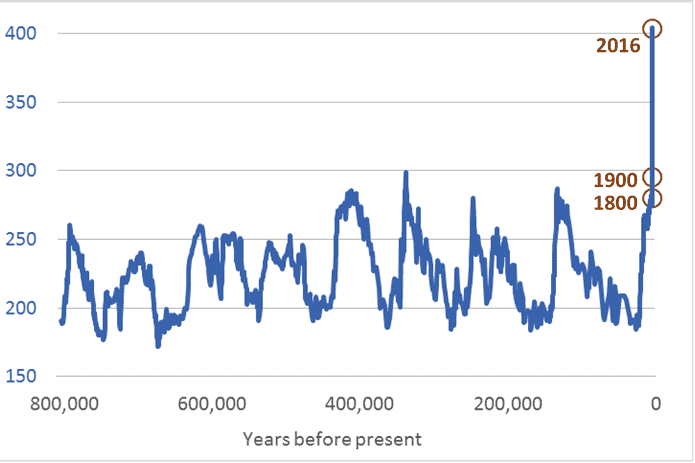Which layer of the atmosphere do we live in?
troposphere
Can be reported as a daily forecast. Short-term atmospheric conditions in an area.
weather
comes from evaporation and steam
water vapor / H2O
The graph shows atmospheric concentrations of a greenhouse gas over time, with a large spike that begins in the 1800s. Which greenhouse gas is most likely shown?

carbon dioxide
What does a paleoclimatologist study?
climate over time/ throughout Earth's history
How does the sun's heat reach Earth?
a. convection
b. radiation
c. conduction
b. radiation
Where is atmospheric pressure the highest?
here on earth/ in the troposphere because there are so many air molecules pushing down on us
Looks at atmospheric measurements for 30 years or more.
climate
this gas comes from burning fossil fuels, deforestation, and vehicles
carbon dioxide (CO2)
What event occurred in the 1850s where humans started to burn more fossil fuels and create factories and new inventions?
The Industrial Revolution
Which proxy record reveals climate data from up to 800,000 years ago? (Frozen layers contain ice bubbles that show us what the air was like and the amount of greenhouse gases in the air. )
ice cores/ boreholes
Which type of heat transfer occurs in our atmosphere and in the mantle of Earth?
a. convection
b. radiation
c. conduction
a. convection
Which layer of the atmosphere is there "good" ozone? What does this do for us?
stratosphere; it blocks some of the UV radiation from the Sun.
1. Michigan gets an average of 150 inches of snow per year.
2. It snowed last year on Christmas.
1. Climate
2. Weather
Which greenhouse gas is produced by livestock farming (cows) and landfills? Which gas comes mostly from fertilizers?
Methane (CH4), nitrous oxide (N2O)
How does Earth's climate normally fluctuate, or change? How is it changing in the past 200 years?
What does a dendrochronologist study? How does that tell us about climate?
They study tree rings to see how old the tree is and what the climate/ rainfall was like while it was growing
What is it called when many trees are removed from an area? Does this cause an increase or decrease in carbon dioxide levels?
deforestation; increase because trees aren't there to do photosynthesis and take carbon OUT of the atmosphere
What gases make up the atmosphere in the following amounts:
78% ______________
20% _______________
1% ________________
1% other trace gases
78% nitrogen, 20% oxygen, 1% water vapor
What is the weather like the higher in altitude you go?
the air is thinner (less pressure) colder.
Name 3 things that add carbon into the atmosphere, and 1 thing that takes carbon OUT of the atmosphere.
Adds carbon: burning fossil fuels, volcanoes, forest fires, deforestation, breathing/cellular respiration, decomposition
Removes carbon: photosynthesis and the ocean absorbs it
Why does ocean acidification occur and how does it affect marine life?
Ocean acidification occurs because the ocean absorbs excess carbon dioxide in the air. It affects coral and shellfish because they cannot grow tough exteriors in the acidic conditions (less carbonate available). Fish populations are smaller on average and have less food available...
List 4 "proxy records," or ways that scientists know about past climates.
coral reefs, tree rings, ice cores/ boreholes, sediments, fossils, pollen, historical accounts.
Tree A has 12 rings. Most of them are very thin. Tree B is from the same species but a different location; it has 16 rings, and most of them are much wider. What does this tell you about the trees?
Tree A is 12 years old and is in a very dry area. Tree B is 16 years old and in a location that receives more rainfall.
How does the biosphere add and remove carbon from the atmosphere?
Plants remove carbon during photosynthesis, animals and humans add carbon to the atmosphere when they exhale.
Do large bodies of water heat and cool quickly or slowly? What does this cause in terms of climate for areas near large bodies of water?
Which greenhouse gas created a hole in the ozone layer until it was banned in many countries?
CFCs (chlorofluorocarbons)
What are 3 causes of climate change?
deforestation, burning fossil fuels, vehicle emissions, agriculture/ increase in methane, factories/ pollution, increased release of CO2, natural processes
What is the most sustainable and efficient way to study tree rings?
Use a tree corner/ borer to take a small sample of the rings rather than cutting the whole tree down.
What is the relationship between atmospheric carbon dioxide and global temperature? Why?
What is the difference between latitude, altitude, and longitude?
Latitude-- horizontal coordinates on Earth. Zero degrees starts at equator.
Longitude-- vertical coordinates on Earth
Altitude-- height or distance from the ground.
Explain the relationship between latitude and climate.
Areas closer to the equator (latitude of zero) have much warmer climates than those further from the equator.
How does the greenhouse effect work? Is it a good or bad thing?
Greenhouse effect-- heat from the sun gets trapped in Earth's atmosphere
It's a good thing because it keeps Earth warm but bad if the atmosphere is trapping too much heat.
List at least 4 effects of climate change.
melting ice, rising sea levels, drought, biodiversity loss, increased temperatures, more extreme and unpredictable weather, extra CO2 in the air, etc.
How can coral reefs reveal past climate conditions? What about fossils or pollen found in rock layers?
Coral has seasonal growth bands (similar to tree rings) that show ocean conditions during their growth.
Fossils and pollen show us what species used to live in an area, which reveals past climate. (ex. woolly Mammoth skeleton found = used to be cold there)
Which fossil fuel was dangerous and explosive, but now it is valuable because it burns cleaner than coal or oil?
natural gas